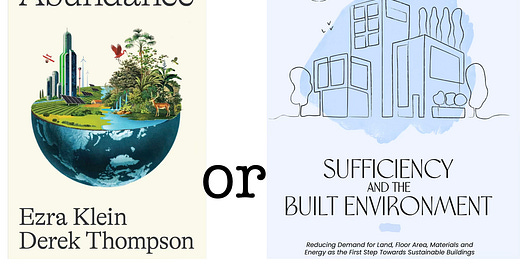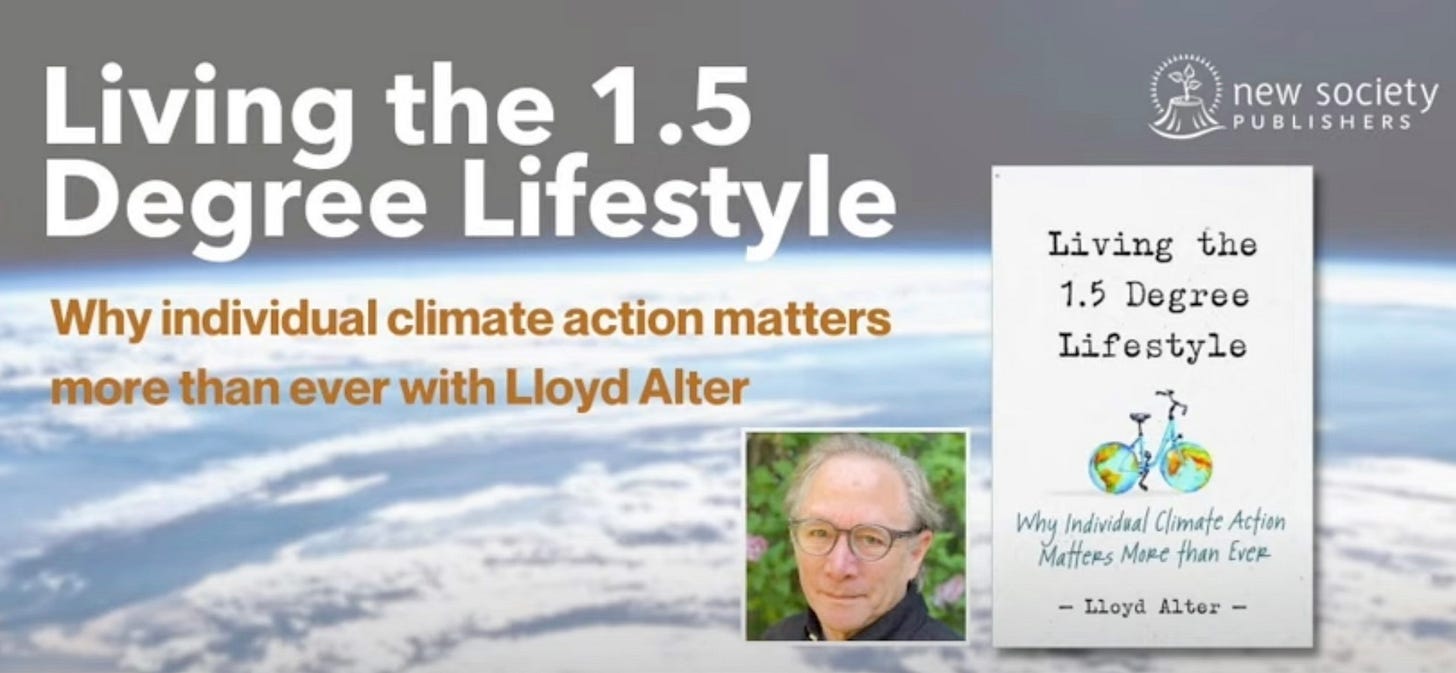Abundance or Sufficiency?
Here's a summary of a lecture where I am critical of so-called abundance agenda.
Everybody is talking about Ezra Klein and Derek Thompson’s book Abundance. I have written two posts addressing points made in the book, countering it with discussions of sufficiency. I have been clarifying my thoughts and preparing a talk about sufficiency, which I am presenting at noon EDT on Monday, 2 June (sign up here) titled “Planning and Designing Housing within Planetary Boundaries.”
The Abundists Klein and Thompson write:
“We seek a politics of abundance that delivers real marvels in the real world. We want more homes and more energy, more cures and more construction. This is a story that must be built out of bricks and steel and solar panels and transmission lines, not just words.”
I also recently read Timothée Parrique’s marvellous new book with the dreadful name Slow Down or Die, where he writes:
“The challenge ahead of us is one of less, lighter, slower, smaller. It is the challenge of restraint, frugality, moderation, and sufficiency.”
The problem with the abundist approach is that it ignores the planetary boundaries we have already breached. We can’t keep making bricks and steel or the kind of housing that we have been building.
It’s getting harder and harder to find the materials we need; there is less copper in a tonne of rock dug out of a copper mine today than there was left in the overburden of mines from a hundred years ago. (More on copper in my recent post We won’t have enough copper supply to meet demand within the decade. What do we do?). Readers point out that we keep finding more copper and more lithium, but it becomes more expensive and environmentally harmful squeezing it out with lower concentrations.
The Abundists say more, more, more, housing and energy and construction, but I quote engineer Will Arnold and say “use less stuff.” Or as architect Kelly Alvarez Doran notes, “Less is Less.” Fix and repurpose what we have before we build new.
I call for less car and more micromobility- you can make 300 e-bikes from the material and batteries that go into one Rivian pickup truck. See Just Being Electric Doesn't Make a Giant Pickup or SUV a Good Thing: “We need smaller, more efficient vehicles that take less energy and carbon to produce and run. Just because it's electric doesn't give it a free pass.”
Less sprawl, which benefits from massive federal subsidies for road infrastructure and fossil fuels;
Less height, where tall skinny buildings often have higher emissions per bedroom than single-family houses; See How tall should a building be: How not to build in a climate crisis.
Less floor area/person and more missing middle/ Goldilocks density housing and multifamily designs as are common in Europe. I look at the new Canadian initiative to build small, low, woodframe multiple unit buildings that have a quarter of the carbon footprint per bedroom of single-family houses.
Less energy consumption and greater efficiency with the Passivhaus standard, as seen here in a cohousing project in Dunedin, New Zealand. See Cohousing is hard, but the results are worth it.
Less upfront carbon and more straw and biogenic materials, as seen in Juraj Mikurcik’s house built of Ecococon prefab straw panels (More: The three little pigs got it wrong)
But also less wood, using it more efficiently and sparingly. See What's the Best Way to Build in Wood? Optimize for form, for grid, for minimizing fibre.
Less complexity. More simplicity. As architect Andrew Waugh recently summarized: “Simple forms. No cantilevers. Not too tall. Use wood.” See Radical Simplicity and Sufficiency are no longer fringe.
Less consumption and more fairness and equity. We can’t have abundance in North America when it affects everybody everywhere. See New OXFAM report goes after the billionaires
And finally, as the Take the jump people say:
The Abundists say we can build more housing by eliminating regulation. I would counter that we need more regulation to ensure that we build more efficient housing with lower carbon intensity at higher densities, with sufficiency in mind, along with equity and joy.
Previously on this subject:
Sufficiency vs abundance: Less is more vs Less is a bore
How to build a world around sufficiency or "frugal abundance"
Special offer!
I do not want to put up a paywall on this site, but it provides a meaningful portion of my income. So here’s a limited time offer: I will send a signed copy of the print edition of “Living the 1.5 Lifestyle” to anyone in the USA or Canada who signs up for a one-year subscription (C$50, cheap at about US$34.95 )
















Lloyd, I 100% agree with you that we need to conserve resources rather than building more crap McMansions and destructive car infrastructure. But I think the underlying idea behind boosting “abundance” has very little to do with our persistent creation of extraneous shit.
I take it to mean that Earth has abundant resources, but they are inequitably claimed and incoherently destroyed by the rich and are therefore unavailable to the poor, who must live in a world of strategically imposed scarcity.
We absolutely DO need more homes! Millions, possibly billions, of people have what you might (euphemistically) call “insufficient” housing. Most people on Earth would love the chance to have “sufficient” resources. So I guess where I depart from you is in the definition of “we.”
If “we” means rich and middle-class humans who have too much already, then we should absolutely be focused on sufficiency. But if “we” means most of humanity, we do not have enough food, clean water, transportation, decent work, or (yes) housing. Most of our species is scrambling for meager crumbs left by the sickeningly wasteful lifestyles that are common here in the Global North—though millions of us, even here, are food and housing insecure too.
My sufficiency is another person’s abundance.
How we begin as humans to offer sufficient resources to everyone is an important conversation, but there is nothing inherently wrong with the concept that there’s plenty to go around (abundance). What’s wrong is that the abundant resources get hogged and compromised by the rich. If we can all learn to share, though, everyone can have enough (sufficiency). Sufficiency and abundance are not really at odds.
Good morning. :Lloyd. I am a faithful reader and often use the ideas you present to spark articles of my own for CleanTechnica. I did so yesterday and found the comments revealing, as many demonstrated differences of opinion about where the line between sufficiency and abundance should be.
I read Abundance earlier this year and found its explanation of how progressive policies inhibit many of the ideas progressive's champion thought provoking. Thank you for continuing to express yourself clearly and forcefully.
Here is a link to my article, should you care to see what my readers have had to say about the ongoing tension between abundance and sufficiency. Personally, I tend more toward the sufficiency side of things.
https://cleantechnica.com/2025/06/02/abundance-or-sufficiency-charting-a-path-to-the-future/#comment-6715971471